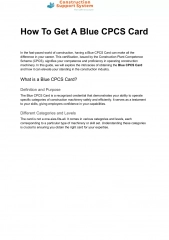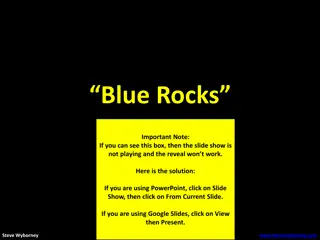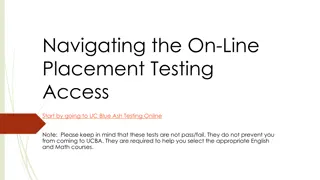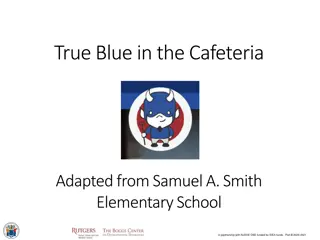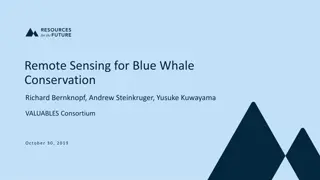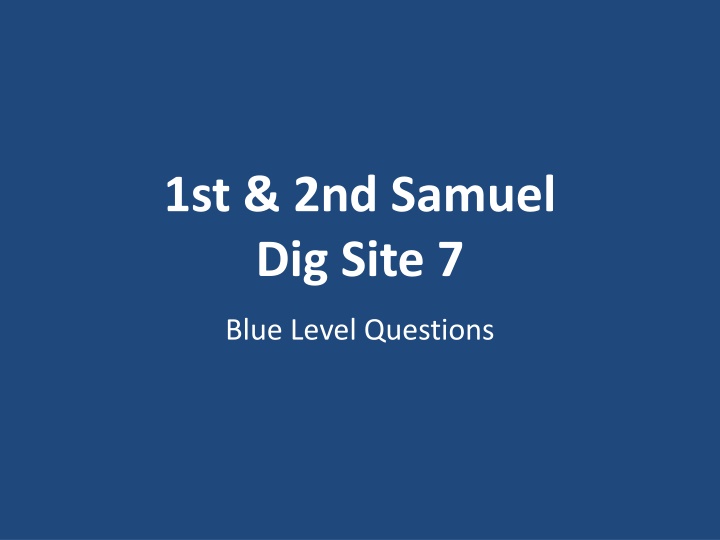
Samuel's Leadership and Farewell Speech Summary
Explore questions related to Samuel's leadership of Israel and his farewell speech, including when he started leading Israel, who questioned him, the people's response, and the evidence he presented to the Israelites. Discover intriguing insights from the books of 1st and 2nd Samuel.
Download Presentation

Please find below an Image/Link to download the presentation.
The content on the website is provided AS IS for your information and personal use only. It may not be sold, licensed, or shared on other websites without obtaining consent from the author. If you encounter any issues during the download, it is possible that the publisher has removed the file from their server.
You are allowed to download the files provided on this website for personal or commercial use, subject to the condition that they are used lawfully. All files are the property of their respective owners.
The content on the website is provided AS IS for your information and personal use only. It may not be sold, licensed, or shared on other websites without obtaining consent from the author.
E N D
Presentation Transcript
1st & 2nd Samuel Dig Site 7 Blue Level Questions
When did Samuel start leading Israel? (12:2) 1. When his sons were born 2. In his youth 3. When he became an adult 4. When he turned 30
When did Samuel start leading Israel? (12:2) 1. When his sons were born 2. In his youth 3. When he became an adult 4. When he turned 30
Who said, Whom have I cheated? Whom have I oppressed? (12:1, 3) 1. Eli 2. David 3. Saul 4. Samuel
Who said, Whom have I cheated? Whom have I oppressed? (12:1, 3) 1. Eli 2. David 3. Saul 4. Samuel
What did the people say to Samuel when he asked if he cheated them, oppressed them, or accepted a bribe? (12:3-4) 1. You have not cheated or oppressed us. 2. You have taken our food without asking. 3. You should not be forgiven for the sins of Eli s sons. 4. All of the above
What did the people say to Samuel when he asked if he cheated them, oppressed them, or accepted a bribe? (12:3-4) 1. You have not cheated or oppressed us. 2. You have taken our food without asking. 3. You should not be forgiven for the sins of Eli s sons. 4. All of the above
In his farewell speech, what evidence was Samuel going to present to the Israelites? (12:7) 1. Evidence that his sons were holy 2. Evidence of all the righteous acts the Lord did for the Israelites 3. Evidence that the Israelites disobeyed God 4. All of the above
In his farewell speech, what evidence was Samuel going to present to the Israelites? (12:7) 1. Evidence that his sons were holy 2. Evidence of all the righteous acts the Lord did for the Israelites 3. Evidence that the Israelites disobeyed God 4. All of the above
What did the Israelites say after the Lord sold them into the hands of their enemies? (12:10) 1. We have sinned. 2. Deliver us from the hands of our enemies. 3. We will serve you. 4. All of the above
What did the Israelites say after the Lord sold them into the hands of their enemies? (12:10) 1. We have sinned. 2. Deliver us from the hands of our enemies. 3. We will serve you. 4. All of the above
What did the Israelites want when they saw Nahash king of the Ammonites moving against them? (12:12) 1. God to save them 2. Samuel to fight for them 3. A king to rule over them 4. All of the above
What did the Israelites want when they saw Nahash king of the Ammonites moving against them? (12:12) 1. God to save them 2. Samuel to fight for them 3. A king to rule over them 4. All of the above
What did Samuel say it would be good for the Israelites to do? (12:14) 1. Fear the Lord 2. Serve and obey the Lord 3. Follow the Lord 4. All of the above
What did Samuel say it would be good for the Israelites to do? (12:14) 1. Fear the Lord 2. Serve and obey the Lord 3. Follow the Lord 4. All of the above
Why did Samuel ask the Lord to send thunder and rain? (12:17) 1. So the crops would have water 2. To scare the Canaanites 3. So the Israelites would see how evil it was to ask for a king 4. So the Philistine camp would be flooded
Why did Samuel ask the Lord to send thunder and rain? (12:17) 1. So the crops would have water 2. To scare the Canaanites 3. So the Israelites would see how evil it was to ask for a king 4. So the Philistine camp would be flooded
What did the Israelites say to Samuel when the Lord sent thunder and rain? (12:18-19) 1. Pray to the Lord so that we won t die. 2. We don t know what to do. 3. We will start to follow the Lord. 4. Don t kill us, Samuel.
What did the Israelites say to Samuel when the Lord sent thunder and rain? (12:18-19) 1. Pray to the Lord so that we won t die. 2. We don t know what to do. 3. We will start to follow the Lord. 4. Don t kill us, Samuel.
Who said, Do not turn away from the Lord, but serve the Lord with all your heart ? (12:20) 1. David 2. Samuel 3. Saul 4. Eli
Who said, Do not turn away from the Lord, but serve the Lord with all your heart ? (12:20) 1. David 2. Samuel 3. Saul 4. Eli
What did Samuel tell the people he was going to do for them? (12:23) 1. Teach them the way that was good and right 2. Become their king 3. Follow in their footsteps 4. Appoint Saul as the priest
What did Samuel tell the people he was going to do for them? (12:23) 1. Teach them the way that was good and right 2. Become their king 3. Follow in their footsteps 4. Appoint Saul as the priest
How long did Saul reign over Israel? (13:1) 1. 30 years 2. 42 years 3. 23 years 4. 49 years
How long did Saul reign over Israel? (13:1) 1. 30 years 2. 42 years 3. 23 years 4. 49 years
What did Saul say when he had the trumpet blown throughout the land ? (13:3) 1. I am the king! 2. Let s fight the Philistines! 3. Let the Hebrews hear! 4. Follow the Lord!
What did Saul say when he had the trumpet blown throughout the land ? (13:3) 1. I am the king! 2. Let s fight the Philistines! 3. Let the Hebrews hear! 4. Follow the Lord!
What did the Philistines have when they fought the Israelites at Geba? (13:5) 1. 3,000 chariots 2. 6,000 charioteers 3. Soldiers as numerous as the sand on the seashore 4. All of the above
What did the Philistines have when they fought the Israelites at Geba? (13:5) 1. 3,000 chariots 2. 6,000 charioteers 3. Soldiers as numerous as the sand on the seashore 4. All of the above
Where did the Israelites hide from the Philistines? (13:6) 1. In caves and thickets 2. Among the rocks 3. In pits and cisterns 4. All of the above
Where did the Israelites hide from the Philistines? (13:6) 1. In caves and thickets 2. Among the rocks 3. In pits and cisterns 4. All of the above
How long did Saul wait for Samuel before offering the sacrifice? (13:8) 1. Three weeks 2. Seven days 3. One month 4. Two days
How long did Saul wait for Samuel before offering the sacrifice? (13:8) 1. Three weeks 2. Seven days 3. One month 4. Two days
What is not a reason Saul offered a sacrifice before Samuel arrived? (13:11-12) 1. The men began to scatter. 2. Samuel told him to go ahead. 3. The Philistines began assembling at Mikmash. 4. All of the above
What is not a reason Saul offered a sacrifice before Samuel arrived? (13:11-12) 1. The men began to scatter. 2. Samuel told him to go ahead. 3. The Philistines began assembling at Mikmash. 4. All of the above
What did Samuel say when Saul offered the sacrifice too early? (13:13-14) 1. You have done a foolish thing. 2. You have not kept the command the Lord your God gave you. 3. Your kingdom will not endure. 4. All of the above
What did Samuel say when Saul offered the sacrifice too early? (13:13-14) 1. You have done a foolish thing. 2. You have not kept the command the Lord your God gave you. 3. Your kingdom will not endure. 4. All of the above
How did Samuel describe the man the Lord sought out to lead Israel? (13:14) 1. A man who is tall and handsome 2. A man who is strong 3. A man after God s own heart 4. A man who is confident
How did Samuel describe the man the Lord sought out to lead Israel? (13:14) 1. A man who is tall and handsome 2. A man who is strong 3. A man after God s own heart 4. A man who is confident
Why did Sauls kingdom not endure? (13:14) 1. He lost too many battles. 2. He had not kept the Lord s commands. 3. He was old. 4. He was not an Israelite.
Why did Sauls kingdom not endure? (13:14) 1. He lost too many battles. 2. He had not kept the Lord s commands. 3. He was old. 4. He was not an Israelite.

